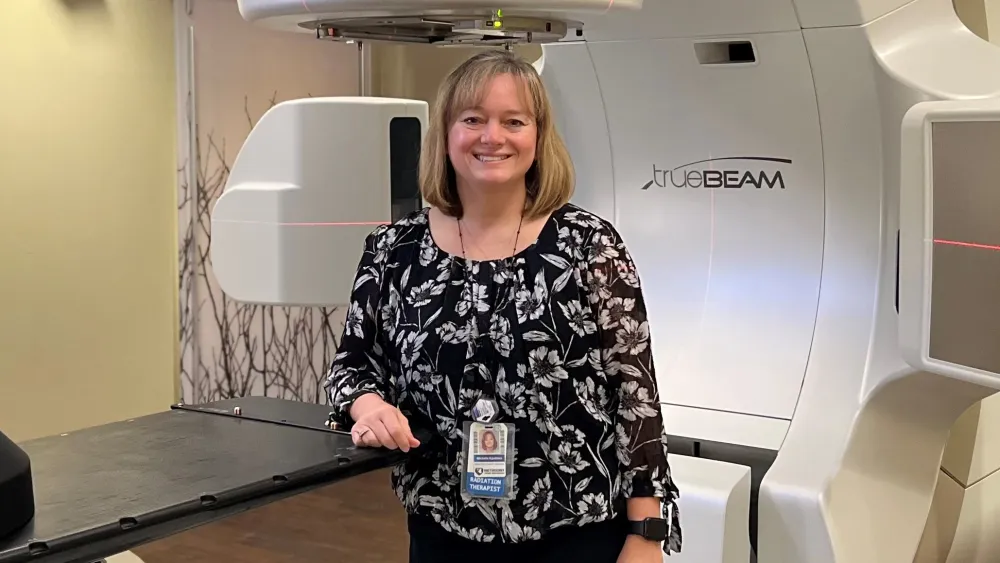
Our People
The Core of What We Do: Michelle Kaufman Is Inspired by Oncology Patients’ Courage
Published: March 31, 2023

In “The Core of What We Do,” you’ll learn more about Methodist’s core service lines – primary care, oncology, cardiology, women’s health and orthopedics/surgical services – and the people whose dedication makes them so impactful for our communities. To explore career opportunities at Methodist, visit bestcare.org/jobs.
Michelle Kaufman, MS, RT (R,T)
Director of Oncology Services
Methodist Jennie Edmundson Hospital Cancer Center

Why is this service line so important? How does it contribute to The Meaning of Care?
This year marks the 27th anniversary of Methodist Jennie Edmundson Hospital having the only nationally accredited cancer program in southwest Iowa that offers medical and radiation oncology services. This accreditation by the American College of Surgeons is a testimony to our quality of care. We pride ourselves on the individual care given to each patient, family members and caregivers.
Methodist is focused on serving our patients with highly personalized care using the latest techniques. Interaction with our cancer team ensures that you receive the best professional services combined with the most compassionate care. We serve our community by offering cutting-edge technology and cancer treatment right here at home.
What’s something people may not know about this service line?
In addition to the Thoracic Clinic services, we launched our Incidental Lung Nodule Program in 2020. This is a joint effort with the health system to provide patients with a comprehensive way to have their lung nodules diagnosed, monitored and treated. A software program helps identify nodules at risk and advance early detection of lung cancer in order to provide better care to the patient.
The cancer center also recently implemented the Hereditary Cancer Risk Program to identify patients who are at higher risk for developing cancer based upon family history. Determining families that have an inherited genetic mutation is important, as the cancer risks in hereditary cancer families are much higher than the general population. Once identified, care management recommendations that may include annual breast MRIs, increased clinical breast exams, annual mammograms and risk reducing therapies are implemented.
We also take a multidisciplinary approach to cancer treatment through our weekly cancer conferences. At this conference, all newly diagnosed cancer patient cases are presented. They receive an in-depth review by surgeons, radiologists, pathologists, medical and radiation oncologists, and other specialized care providers.
Tell us more about your role.
As director of Oncology Services, my responsibilities include the Breast Health Center, Cancer Registry, Colorectal Surgery Center, Hereditary Cancer Risk Program, Radiation Oncology and Thoracic Clinic.
What do you enjoy most about this team?
We have an amazing cancer center team of providers, nurses, radiation therapists, dosimetrists, physicists, medical assistants, and registration specialists who are truly dedicated to the well-being of our patients. They are smart, forward-thinking individuals who embrace new technology and are not afraid to grow and change.
Do you have any memories that stick out?
There have been many memorable events over the years, such as the development of the Hereditary Cancer Risk and Thoracic programs, and the addition of the lung navigational robot. Perhaps the most memorable moment is when we added the new TrueBeam linear accelerator in Radiation Oncology. We came in early on a Saturday morning to watch a crane lift the multimillion-dollar piece of equipment from the street, over the parking garage and through a hatch in the ceiling. We were so excited that the entire team came in to witness this special nerve-racking event.
Why did you come to Methodist, and why have you stayed?
I grew up in Council Bluffs and have worked at Methodist Jennie Edmundson Hospital in various capacities since 1990. I started in the Medical Records Department while attending the Jennie Edmundson School of Radiologic Technology and then worked as a radiographer until I graduated with a Bachelor of Science as a radiation therapist. I moved into a leadership position in 2008 and later completed a Master of Science in health operations management. I have always felt supported in these roles and value the culture and relationships formed over the years. The atmosphere of the Jennie family is palpable and makes it easy to come to work every day.
What does The Meaning of Care mean to you?
I feel privileged to have spent my entire career focused on oncology care. Oncology patients, in my opinion, are the most courageous and inspiring individuals. Every patient who walks through our doors is fighting a different battle, and we’re here to work alongside them. Our mission is to provide individualized medical care and comprehensive support.
What’s the best thing about your role at Methodist?
I love providing support for personnel caring for patients and helping them navigate the process of diagnosis, active treatment and survivorship. We’re also fortunate to work with the Jennie Edmundson Foundation Spirit of Courage efforts, which aid patients who need help paying expenses associated with cancer. Without this type of help, many vulnerable members of our community may not be able to afford treatment due to transportation and medication expenses. This partnership allows us to take better care of the patient and address their most immediate needs.
What do you enjoy outside of your time at Methodist?
My husband and I like to travel and spend time with family and friends. We have two grown children, so we also enjoy spending more quality time together and enjoying life.

